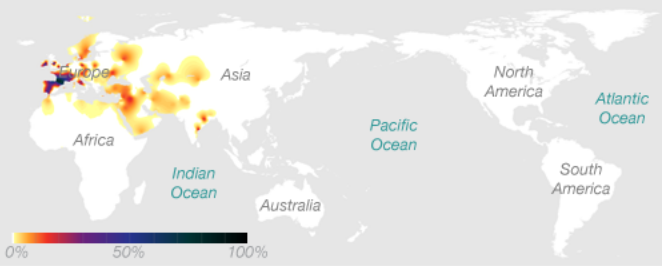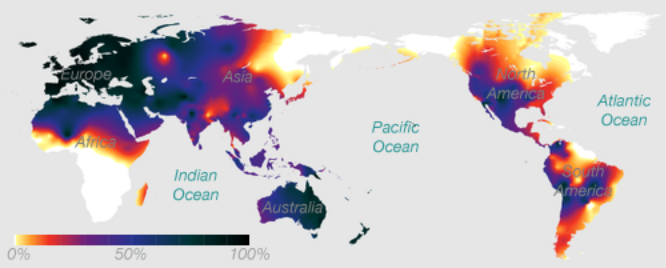FROM HUFF'n POST
In liberal Jewish synagogues across the country, women have achieved feminist success. They wear ritual garments. They read from the Torah. They are rabbis. But when you enter an Orthodox Jewish synagogue, you enter a gender time warp. Here, women do not count in a prayer quorum. They are not permitted near the Torah. In many cases, you would be hard-pressed even to figure out where the women are located, since they may be seated behind a curtain or wall, or upstairs in a gallery, far from the action. As Tevye the milkman would say, "Sounds crazy, no?"
In many synagogues, women cannot even hold a position of any meaningful leadership: The National Council of Young Israel forbids its 140-member Orthodox synagogues to elect a female president.
If a female synagogue president can be prohibited, imagine the Orthodox Jewish reaction to a female rabbi -- a woman with religious authority. Two years ago, a prominent Orthodox rabbi in New York, Avi Weiss of the
Hebrew Institute of Riverdale, in consultation with Blu Greenberg, founder of the
Jewish Orthodox Feminist Alliance, bravely broke with conventional Orthodox tradition and ordained Sara Hurwitz. Since the mid-1990s, at least three other Orthodox rabbis had followed their conscience and quietly ordained individual women. But Weiss was the first to ordain a woman publicly.
Weiss never actually called Hurwitz "rabbi." Instead, Weiss coined a term, "maharat," an acronym of four Hebrew words --
manhigah,
hilhatit,
ruhanit and
toranit -- which means a "female leader in Jewish religious law, spiritual matters and Torah." The word is cumbersome; it requires detailed explanation. Everyone with a passing familiarity of Judaism has at least some notion of the concept of "rabbi." But no one, not even those steeped in Orthodox Jewish culture and tradition, not even those of us immersed in the feminist world, can easily explain the definition or derivation of "maharat." When asked about the term, I typically reel off the Hebrew words that are its building blocks, then I translate them into English. I inevitably forget one of the terms, get confused and start again. The process is exhausting, confusing and off-putting.
More troubling, "maharat" connotes a secondary status. For this reason, I opposed the title the instant I heard it. Created for women alone, and designed to differentiate women rabbis from "real" rabbis, the title evokes the bridesmaid who is never the bride.
Last year, Weiss announced that Hurwitz had a new title: "rabba" (ra-BAH). This term, he said, would clarify that Hurtwitz is a full member of the rabbinic staff. A feminized version of the title "rabbi" made sense; Hurwitz has the same credentials as a male rabbi. She completed the same course of study required of male rabbis and works in the same capacity, with the same pastoral obligations.
True, Hurwitz was not being called "rabbi," which Orthodox feminists prefer, because the term conveys the same authority and respect that men enjoy. But in the Orthodox Jewish world, change comes slowly. "Rabba" was close enough -- and the implications obvious enough -- to make those of us active in Orthodox feminism feel triumphant. Moreover, Weiss announced that Hurwitz would head a new seminary for women, Yeshivat Maharat, educating a future pool of women for the rabbinate, so that she would not be the one and only "rabba."
So here you have a woman rabbi who cedes the status of rabbi to respect right-wing members of the Orthodox world. How did that wing react? By denouncing those with the audacity even to imagine that women could approach religious leadership. A March 2010 statement from Agudath Israel, an ultra-Orthodox organization of rabbis, threatened to expel Hurwitz's synagogue from Orthodoxy. The
Rabbinical Council of America, one of the world's largest and oldest organizations of Orthodox rabbis, likewise pressured Weiss.
After several weeks, Weiss retreated -- somewhat. He agreed not to ordain women as rabbis at Yeshivat Maharat and not to confer the title "rabba" upon the graduates. Turns out that Hurwitz is indeed the one and only "rabba."
Last month, the most liberal Orthodox rabbinic group in the United States, the
International Rabbinic Fellowship, which was founded three years ago by Weiss, together with Rabbi Marc Angel, voted down its first proposal to accept women as members of the organization. But at least the issue is on the agenda.
The current state of affairs is immoral and shameful. There is no halakhic (Jewish legal) prohibition against female rabbis. A "rabbi" is simply a teacher and master of Jewish texts and law. Therefore, some of us are taking matters into our own hands. We don't have the religious authority to ordain anyone. But we recognize the rabbinic status of the handful of women who have been ordained by Orthodox authorities.
We are also involved in independent prayer groups in which women and men lead together, even though they do not sit together. These groups are not egalitarian: women may not lead every part of the service. But women are encouraged to lead all parts for which there is no halakhic prohibition. In the
independent prayer group I attend on the upper east side of Manhattan, Yavneh, women recite Hallel, one of the most beautiful songs of praise in the liturgy; women hold the Torah; women read from the Torah; women recite the blessing over the wine.
Like Tevye from
Fiddler on the Roof, we struggle with the concept that sacred tradition is fixed yet flexible. Everyone involved in religion -- any religion, in any level of observance -- knows that the key is to find the balance between tradition and modernity.


 Last Xmas, the genome company, 23andMe had a sale! $100 for a genome. My wife and I ordered our done and the results are in!
Last Xmas, the genome company, 23andMe had a sale! $100 for a genome. My wife and I ordered our done and the results are in! [/caption]
[/caption] Lets start with the paternal side. Paternal Haplogroup:R1b1b2a1a2d. By family stories, I knew we were from Andalus, that is pre 1492 Spain. . That story is confirmed here.
Lets start with the paternal side. Paternal Haplogroup:R1b1b2a1a2d. By family stories, I knew we were from Andalus, that is pre 1492 Spain. . That story is confirmed here.  [/caption]
[/caption]by Bruce Riedel at Daily Beast
